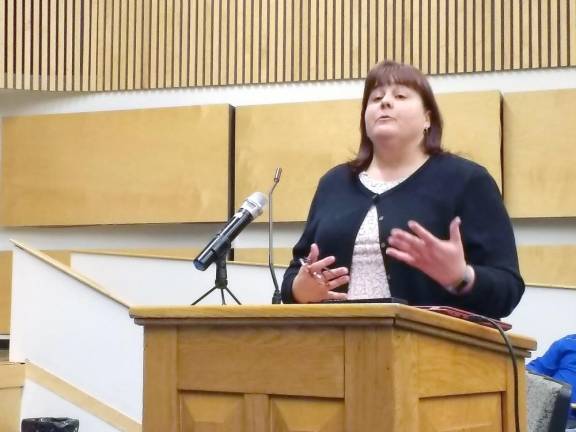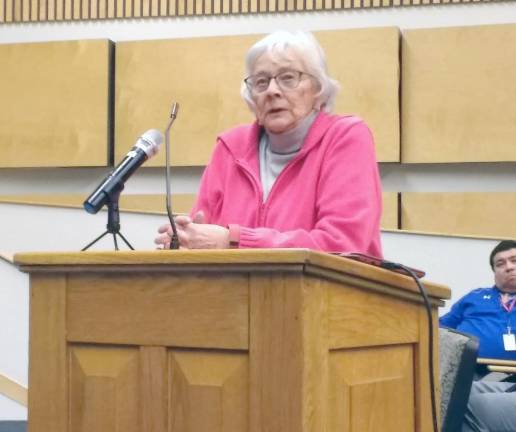Residents object to demolishing old school
Chester. Most members of the public who spoke at recent meetings said they were opposed to the Chester school district's $7.9 million plan to raze the Maple Avenue School and replace it with athletic facilities. They said they'd rather see the building used as a library, senior housing, or some other purpose.


Most members of the public who spoke at two recent meetings objected to razing the Maple Avenue School, preferring to see the building preserved and repurposed.
Voters will decide in a Feb. 25 referendum whether the Chester Union Free School District should borrow $7.9 million to demolish the old school and replace it with multisport athletic fields and facilities. At a village board meeting on Feb. 10 and again at a Chester school board meeting on Feb. 12, residents wanted to make their views known.
Long-time resident Amy Barnes questioned whether the building was really in such bad shape. The community had been through this before, she said.
“This district has been told less than the truth in the past," she said, exempting the present school board. "When they wanted to build this building (the Chester Academy), we were told the Maple Avenue School was not fit for humans to be in. Yet no sooner had the Chester children left than the BOCES children moved in.”
BOCES occupied the building from 2004 to 2019.
Make it a library
Library director Maureen Jagos has worked at the Chester Public Library for 23 years. She has a "Plan B”: move the library back to where it began — in the village.
The Maple Avenue building would double the library's space and allow it to do so much more, she said. The library had to stop its involvement in the backpack program for children because it didn't have enough space and some residents were unable to get there, she said. More room at the library would allow for English as a second language and other classes. And the library would also be accessible to residents who do not drive, said Jagos.
Other groups, like the food pantry, which is short on storage space and not compliant with the Americans with Disabilities Act, could also use the space, she said. So could the Chester Historical Society, which will lose its office space when village hall moves to the former Lippincott Funeral Home.
Turf war
Coach Ron Stover, who started Chester's football team in 2001, approved of the district’s plan. The football field at Chester Commons is not maintained to high enough standards, he said. A field with artificial turf, which is included in the school district's plans, would not be so subject to inclement weather and would be also used more often, such as by the soccer teams, he said.
Gordon Shehab said the field at Chester Commons could be upgraded for a lot less money than the school district proposes to spend. Artificial turf can contain toxic metals, he said. And where would the rain runoff go? he asked.
Taxpayers in the district will pay $189 a year for 20 years to pay for the project.
“The artificial turf has to be redone every 8 to 10 years so within that 20-year period, it would have to be replaced at least twice, which would be additional tax increases," Shehab said.
Noise and congestion
Shehab said the project would also hurt the residential neighborhood with noise, light, pollution, and congestion with parking on local streets.
David Stevenson said the district’s plan is subject to municipal zoning laws. He cited court cases where school plans were successfully challenged when such plans negatively affected traffic congestion, property values, and municipal services or detracted from the public’s health, safety, and welfare. He urged the district to send its proposal through the zoning board.
Stevenson said he researched the successful re-purposing of school buildings, and found it can be done through private financing at no cost to the taxpayer.
Leslie Smith said the village’s comprehensive plan committee, which has been working for two and a half years, will include in its plan the preservation of historic structures. The district’s plan repudiates all they have been working to enact, she said.
“There are 80-plus vacant acres adjacent to Chester Academy,” she said. “That is the place for your athletic facilities.”
She cited a 2019 letter from the Department of Parks, Recreation and Historic Preservation that stated “the removal of this (largely intact) building creates an adverse impact.”
Mary Altobelli said the district’s plan is “a slap in the face and an insult to the residents of Chester. The noise, lights and traffic generated will be a nightmare and destroy the quality of life for this residential neighborhood. The price tag is ridiculous and the average citizen, who by the way, the school board is asking to pay for it, would not have access or need for it."
She cited examples where school boards have worked with their communities to repurpose and revitalize unused school buildings: In Ithaca, a former high school is now an urban mall. A school in Albany is a mixed-income senior living community. Another is a rental property, she said. In Newburgh, the Liberty Street School is now a TV and film studio. In Middletown, a school has become a community center. In Highland Falls, an architectural firm from Beacon has proposed to turn a former elementary school into a green building with rental units and use it as their headquarters.
Patty Salerno pointed out that school enrollment is declining, and said athletic fields are only used by a small portion of the population.
“A football field does not fit into a residential neighborhood,” she said.
Nancy George read a statement by Chester historian Clif Patrick, who was at a town board meeting. He said, in part: “Walnut Avenue residents have suffered with excessive noise, trash and blocked driveways since the expansion of the ballfields. This proposal adds 1,000-seat bleachers, inadequate parking 80-ft high field lighting, a [35-ft] fence on the Maple Avenue property line and no sidewalk on that side of Maple Avenue.”
He said other parcels adjacent to Chester Academy would be a more appropriate for athletic fields.
Senior housing was mentioned as a possible use for the building. Some also mentioned that as taxpayers, they would be willing to pay more for the upkeep of the present football field at Chester Commons. A building condition survey estimates costs to rehabilitate the building to “bring it up to standard.” Those costs are now estimated to be $4 million and includes things like new windows.
For information on how to vote in the Feb. 25 referendum, please turn to page 11. For a history of the Maple Avenue School, please turn to pages 9 to 10.